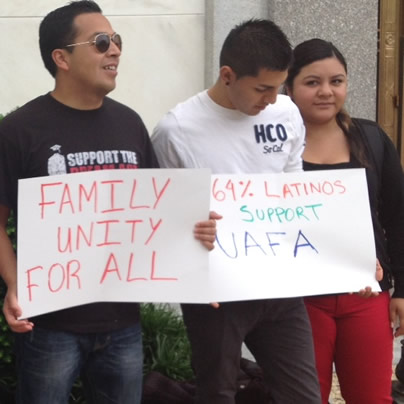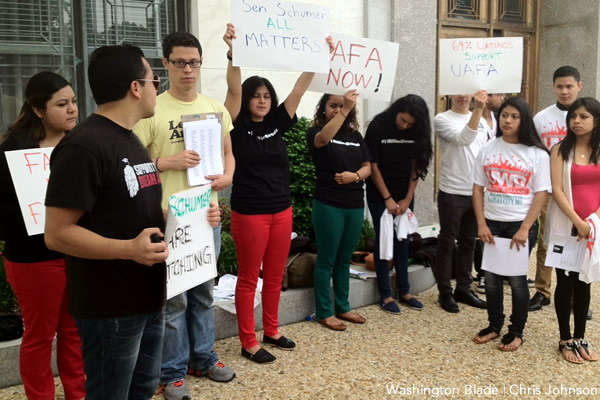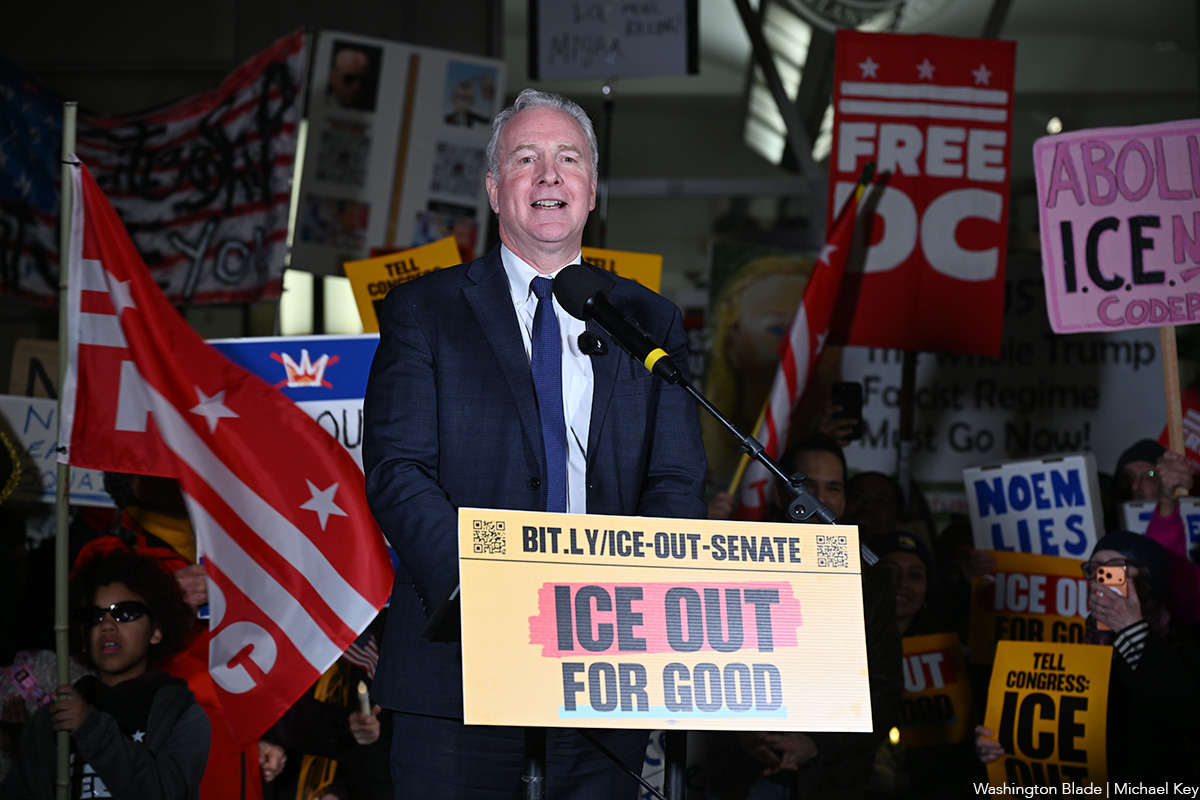Politics
Schumer receives 6,500 names calling for gay-inclusive reform
N.Y. senator is lone committee Dem to withhold support for inclusive bill


LGBT and immigration activists prepare to deliver signatures to Sen. Charles Schumer. (Washington Blade photo by Chris Johnson)
The office of Sen. Chuck Schumer (D-N.Y.) received on Thursday via hand delivery 6,500 petition signatures from LGBT rights supporters urging him to include bi-national gay couples as part of comprehensive immigration reform.
The signatures — collected over the course of one day — were the result of the efforts from the LGBT grassroots advocacy group GetEQUAL in coordination with the pro-immigrant organizations Presente.org, DRM Action and Uniting We Dream.
According to the LGBT group Immigration Equality, Schumer is the only one of the 10 Democrats on the Senate Judiciary Committee who hasn’t committed to supporting amendments that would include bi-national couples as part of immigration reform. Given Republican opposition, Schumer’s vote will be necessary for a majority vote in committee to amend the larger bill.
Felipe Sousa-Rodriguez, co-director of GetEQUAL, personally handed the names to Schumer’s staff on Thursday as part of a group of about a half-dozen activists.
“It’s interesting because he’s making a political mistake,” Sousa-Rodriguez told the Blade. “The whole reason why this is even happening is because of Latinos, and Latinos hold the key to the White House. But 64 percent of voters support the inclusion of same-sex couples in immigration reform and 59 percent of Latino voters support same-sex marriage. Latinos have turned a page, the country has turned a page, but D.C. keeps being stuck in the ’90s.”
A Brazilian native who’s married to a U.S. citizen, Sousa-Rodriguez is an undocumented immigrant who came to the United States at a young age and would be able to gain citizenship through a marriage-based green card application if the immigration reform included the provision for bi-national couples.
Cesar Vargas, executive political director of DRM Action Coalition, represented pro-immigrant groups who want to see the inclusion of bi-national same-sex couples as part of a reform bill pending before the Senate.
“During 2012, we worked during the campaign season to ensure that the Latino community was heard and to ensure that Democrats and positive-minded Republicans were on board [with immigration reform],” Vargas said. “But … we fought for immigration reform for all families, not to exclude anyone else. So, that’s one of the things that we want to send to Sen. Schumer that New York voters and Latinos from New York are demanding immigration reform for all families and not just for a few.”
The staffer who received the signatures on behalf of Schumer was Veronica Duron, who embraced Sousa-Rodriguez when he came into the office because the two knew each other before she started work with the senator.
Duron noted that Schumer is a co-sponsor of the Uniting American Families Act as a standalone bill, but couldn’t say the senator could commit to a vote to include the measure as part of immigration reform at this time.
“I don’t know; that’s the question we’ve been asking,” Duron said. “In every scenario, how we can possibly have UAFA in the bill and still get it to pass on the floor? And so, we’re trying to come up with best scenario possible to get it in the bill and still get it to come to the floor and get 60 votes.”
The Senate Judiciary Committee will on Monday begin considering family unification issues relevant to immigration reform, which would include two amendments filed by Sen. Patrick Leahy (D-Vt.) for bi-national gay couples. Consideration of family unification issues is likely to continue for the period of that week.
One of the amendments mirrors UAFA, which is for “permanent partners” and the other would be limited to married bi-national same-sex couples. Both measures, according to legal experts, would be inoperable in the event that the U.S. Supreme Court strikes down the Defense of Marriage Act.
Meanwhile, Senate Republicans continue to express opposition to the idea of including bi-national same-sex couples as part of immigration reform. On Tuesday, Sen. Lindsey Graham (R-S.C.), a member of the committee and the “Gang of Eight” that produced the bill, tweeted, “If the Judiciary Committee tries to redefine marriage in the immigration bill they will lose me and many others.”
His comments are along the lines of what Sens. Marco Rubio (R-Fla.), John McCain (R-Ariz.) and Jeff Flake (R-Ariz.) have said in opposition to the idea of including gay couples in the bill. Additionally, Sen. Orrin Hatch (R-Utah) made comments to the Washington Blade urging Leahy not to include the pro-gay amendments.
Nonetheless, Sousa-Rodriguez said his organization is focusing its attention on Schumer because his vote is necessary for unanimous support among the Democrats on the committee.
“Sen. Schumer is the only Democrat that hasn’t committed to the inclusion of UAFA into the bill in the committee,” Sousa-Rodriguez said. “All of the other Democrats on the committee already agree that they will vote for UAFA and he hasn’t yet, so that’s why we’re doing this right.”
Asked whether an immigration bill without these LGBT provisions is worth supporting, Sousa-Rodriguez said it would still protect LGBT people — noting that among the 11 million undocumented immigrants are an estimated 270,000 LGBT people — but maintained the package could be better.
“UAFA is key piece of legislation that we want to include in order to protect our families as well,” he said.
Congress
McBride, other US lawmakers travel to Denmark
Trump’s demand for Greenland’s annexation overshadowed trip

Delaware Congresswoman Sarah McBride is among the 11 members of Congress who traveled to Denmark over the past weekend amid President Donald Trump’s continued calls for the U.S. to take control of Greenland.
McBride, the first openly transgender person elected to Congress, traveled to Copenhagen, the Danish capital, with U.S. Sens. Chris Coons (D-Del.), Thom Tillis (R-N.C.), Jeanne Shaheen (D-N.H.), Dick Durbin (D-Ill.), and Lisa Murkowski (R-Alaska) and U.S. Reps. Steny Hoyer (D-Md.), Gregory Meeks (D-N.Y.), Madeleine Dean (D-Pa.), Don Bacon (R-Neb.), and Sarah Jacobs (D-Calif.). The lawmakers met with Danish Prime Minister Mette Frederiksen and Greenlandic MP Pipaluk Lynge, among others.
“I’m grateful to Sen. Coons for his leadership in bringing together a bipartisan, bicameral delegation to reaffirm our support in Congress for our NATO ally, Denmark,” said McBride in a press release that detailed the trip. “Delaware understands that our security and prosperity depend on strong partnerships rooted in mutual respect, sovereignty, and self-determination. At a time of growing global instability, this trip could not be more poignant.”
Greenland is a self-governing territory of Denmark with a population of less than 60,000 people. Trump maintains the U.S. needs to control the mineral-rich island in the Arctic Ocean between Europe and North America because of national security.
The Associated Press notes thousands of people on Saturday in Nuuk, the Greenlandic capital, protested against Trump. British Prime Minister Keir Starmer is among those who have criticized Trump over his suggestion the U.S. would impose tariffs against countries that do not support U.S. annexation of Greenland.
A poll that Sermitsiaq, a Greenlandic newspaper, and Berlingske, a Danish newspaper, commissioned last January indicates 85 percent do not want Greenland to become part of the U.S. The pro-independence Demokraatit party won parliamentary elections that took place on March 12, 2025.
“At this critical juncture for our countries, our message was clear as members of Congress: we value the U.S.-Denmark partnership, the NATO alliance, and the right of Greenlanders to self-determination,” said McBride on Sunday in a Facebook post that contained pictures of her and her fellow lawmakers meeting with their Danish and Greenlandic counterparts.
Congress
Van Hollen speaks at ‘ICE Out for Good’ protest in D.C.
ICE agent killed Renee Nicole Good in Minneapolis on Jan. 7

U.S. Sen. Chris Van Hollen (D-Md.) is among those who spoke at an “ICE Out for Good” protest that took place outside U.S. Customs and Border Protection’s headquarters in D.C. on Tuesday.
The protest took place six days after a U.S. Immigration and Customs Enforcement agent shot and killed Renee Nicole Good, a 37-year-old woman in Minneapolis.
Good left behind her wife and three children.
(Video by Michael K. Lavers)
Congress
Advocates say MTG bill threatens trans youth, families, and doctors
The “Protect Children’s Innocence” Act passed in the House

Georgia Congresswoman Marjorie Taylor Greene has a long history of targeting the transgender community as part of her political agenda. Now, after announcing her resignation from the U.S. House of Representatives, attempting to take away trans rights may be the last thing she does in her official capacity.
The proposed legislation, dubbed “Protect Children’s Innocence Act” is among the most extreme anti-trans measures to move through Congress. It would put doctors in jail for up to 10 years if they provide gender-affirming care to minors — including prescribing hormone replacement therapy to adolescents or puberty blockers to younger children. The bill also aims to halt gender-affirming surgeries for minors, though those procedures are rare.
Greene herself described the bill on X, saying if passed, “it would make it a Class C felony to trans a child under 18.”
According to KFF, a nonpartisan source for health policy research, polling, and journalism, 27 states have enacted policies limiting youth access to gender-affirming care. Roughly half of all trans youth ages 13–17 live in a state with such restrictions, and 24 states impose professional or legal penalties on health care practitioners who provide that care.
Greene has repeatedly introduced the bill since 2021, the year she entered Congress, but it failed to advance. Now, in exchange for her support for the National Defense Authorization Act, the legislation reached the House floor for the first time.
According to the 19th, U.S. Rep. Sarah McBride (D-Del.), the first trans member of Congress, rebuked Republicans on the Capitol steps Wednesday for advancing anti-trans legislation while allowing Affordable Care Act tax credits to expire — a move expected to raise health care costs for millions of Americans.
“They would rather have us focus in and debate a misunderstood and vulnerable one percent of the population, instead of focusing in on the fact that they are raiding everyone’s health care,” McBride said. “They are obsessed with trans people … they are consumed with this.”
Polling suggests the public largely opposes criminalizing gender-affirming care.
A recent survey by the Human Rights Campaign and Global Strategy Group found that 73 percent of voters in U.S. House battleground districts oppose laws that would jail doctors or parents for providing transition-related care. Additionally, 77 percent oppose forcing trans people off medically recommended medication. Nearly seven in 10 Americans said politicians are not informed enough to make decisions about medical care for trans youth.
The bill passed the House and now heads to the U.S. Senate for further consideration.
According to reporting by Erin Reed of Erin In The Morning, three Democrats — U.S. Reps. Henry Cuellar and Vicente Gonzalez of Texas and Don Davis of North Carolina — crossed party lines to vote in favor of the felony ban, joining 213 Republicans. A total of 207 Democrats voted against the bill, while three lawmakers from both parties abstained.
Advocates and lawmakers warned the bill is dangerous and unprecedented during a multi-organizational press call Tuesday. Leaders from the Human Rights Campaign and the Trevor Project joined U.S. Rep. Becca Balint (D-Vt.), Dr. Kenneth Haller, and parents of trans youth to discuss the potential impact of restrictive policies like Greene’s — particularly in contrast to President Donald Trump’s leniency toward certain criminals, with more than 1,500 pardons issued this year.
“Our MAGA GOP government has pardoned drug traffickers. They’ve pardoned people who tried to overthrow the government on January 6, but now they want to put pediatricians and parents into a jail cell for caring for their kids,” said Human Rights Campaign President Kelley Robinson. “No one asked for Marjorie Taylor Greene or Dan Crenshaw or any politician to be in their doctor’s office, and they should mind their own business.”
Balint, co-chair of the Congressional Equality Caucus, questioned why medical decisions are being made by lawmakers with no clinical expertise.
“Parents and doctors already have to worry about state laws banning care for their kids, and this bill would introduce the risk of federal criminal prosecution,” Balint said. “We’re talking about jail time. We’re talking about locking people up for basic medical care, care that is evidence-based, age-appropriate and life-saving.”
“These are decisions that should be made by doctors and parents and those kids that need this gender-affirming care, not certainly by Marjorie Taylor Greene.”
Haller, an emeritus professor of pediatrics at St. Louis University School of Medicine, described the legislation as rooted in ideology rather than medicine.
“It is not science, it is just blind ideology,” Haller said.
“The doctor tells you that as parents, as well as the doctor themselves, could be convicted of a felony and be sentenced up to 10 years in prison just for pursuing a course of action that will give your child their only chance for a happy and healthy future,” he added. “It is not in the state’s best interests, and certainly not in the interests of us, the citizens of this country, to interfere with medical decisions that people make about their own bodies and their own lives.”
Haller’s sentiment is echoed by doctors across the country.
The American Medical Association, the nation’s largest organization that represents doctors across the country in various parts of medicine has a longstanding support for gender-affirming care.
“The AMA supports public and private health insurance coverage for treatment of gender dysphoria and opposes the denial of health insurance based on sexual orientation or gender identity,” their website reads.
Rodrigo Heng-Lehtinen, senior vice president of public engagement campaigns at the Trevor Project, agreed.
“In Marjorie Taylor Greene’s bill [it] even goes so far as to criminalize and throw a parent in jail for this,” Heng-Lehtinen said. “Medical decisions should be between patients, families, and their doctors.”
Rachel Gonzalez, a parent of a transgender teen and LGBTQ advocate, said the bill would harm families trying to act in their children’s best interests.
“No politician should be in any doctor’s office or in our living room making private health care decisions — especially not Marjorie Taylor Greene,” Gonzalez said. “My daughter and no trans youth should ever be used as a political pawn.”
Other LGBTQ rights activists also condemned the legislation.
Tyler Hack, executive director of the Christopher Street Project, called the bill “an abominable attack on the transgender community.”
“Marjorie Taylor Greene’s last-ditch effort to bring her 3-times failed bill to a vote is an abominable attack on the transgender community and further cements a Congressional career defined by hate and bigotry,” they said. “We are counting down the days until she’s off Capitol Hill — but as the bill goes to the floor this week, our leaders must stand up one last time to her BS and protect the safety of queer kids and medical providers. Full stop.”
Hack added that “healthcare is a right, not a privilege” in the U.S., and this attack on trans healthcare is an attack on queer rights altogether.
“Marjorie Taylor Greene has no place in deciding what care is necessary,” Hack added. “This is another attempt to legislate trans and queer people out of existence while peddling an agenda rooted in pseudoscience and extremism.”
U.S. Rep. Mark Takano (D-Calif.), chair of the Congressional Equality Caucus, also denounced the legislation.
“This bill is the most extreme anti-transgender legislation to ever pass through the House of Representatives and a direct attack on the rights of parents to work with their children and their doctors to provide them with the medical care they need,” Takano said. “This bill is beyond cruel and its passage will forever be a stain on the institution of the United States Congress.”
The bill is unlikely to advance in the Senate, where it would need 60 votes to pass.


















